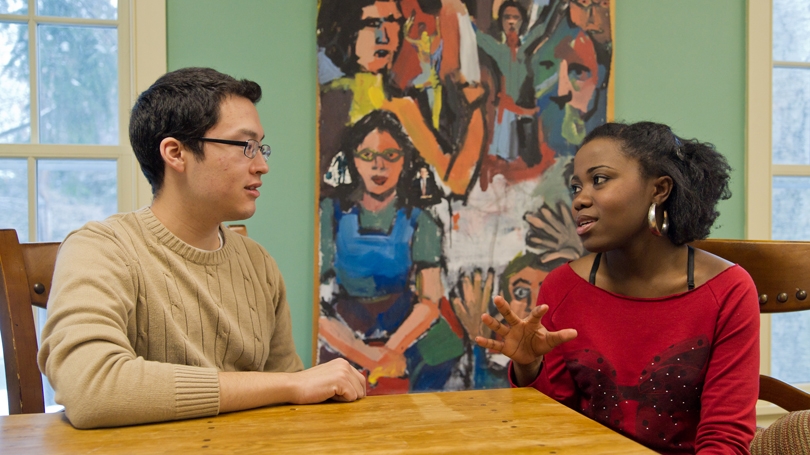
- Undergraduate
- Foreign Study
- Fellowships
- News & Events
- People
Back to Top Nav
Back to Top Nav
Back to Top Nav
In the summer of 2009, Francisco Herrera ’13, the first in his family to attend college, left his home in Miami to begin his first year at Dartmouth.
Herrera’s parents, Maria Luisa and Francisco Herrera Sr.—both Spanish-speaking immigrants from Nicaragua—had done their best to ensure Herrera was prepared, providing him with new clothes for the winter months and money for books.
But Herrera says, “When I arrived on campus, I had a lot of anxiety and concerns, and it was hard not to feel out of place. I kept wondering—was it strange only to me?”
Herrera found warm welcomes throughout campus, but he was especially pleased to see a sign for first-generation college students that read, “So you got to Dartmouth. Now what?”
Herrera connected with the students who had posted the invitation—among them Micaela Klein ’10 and Andrea Obando ’10. About 9 percent of Dartmouth undergraduates are first-generation college students, and Klein and Obando had formed a group to help them navigate the academic rigor of Dartmouth.
“We wanted to offer something that was more than emotional support for students,” Klein told The Dartmouthstudent newspaper at the time. So the students—many of whom had not attended college-preparatory high schools—met, shared questions and concerns, and learned more about Dartmouth.
“Looking back,” says Herrera, “I appreciate even more how important that outreach was. It showed me that it was OK to ask the basic questions, like ‘What’s the Registrar?’ or ‘What are office hours?’ or even ‘What’s sociology?’ Knowing that what I was feeling wasn’t my own perception, but something that was real, was very reassuring.”
Now a junior, Herrera is giving back the same support that he received. In addition to serving as the advisor for the Latin American, Latino, and Caribbean Studies(LALACS) house, he is a mentor for Dartmouth’s now-formal First-Year Student Enrichment Program (FYSEP).
In the past two years, he has mentored four FYSEP students—from Arizona, California, New York, and Texas—and he regularly meets with his two current mentees for lunch and exchanges emails and text messages with them. Herrera also spends about 10 hours a week working with Liz Agosto ’01, special assistant to the dean of the College, to further develop FYSEP.
Academically, Herrera debated between majoring in history and chemistry. He eventually decided on the latter, due in part to the enthusiasm of chemistry professors Gordon Gribble and Jon Kull ’88.
Herrera particularly enjoyed an eight-week lab section taught by Kull, who Herrera says “shows you how to put the textbook into a flask.” Now with plans to become a doctor, Herrera has his eye on a Johns Hopkins University program that supports minority students pursuing an MD or PhD.
Today, as Herrera sits in the Collis Center wearing a Dartmouth T-shirt, he is clearly confident and comfortable—a far cry from the person who once “felt out of place” on campus. Following an interview, he heads off to find a first-year student, a participant in FYSEP, who had contacted him.
“I just want to say hi, and see if she needs anything,” he says.